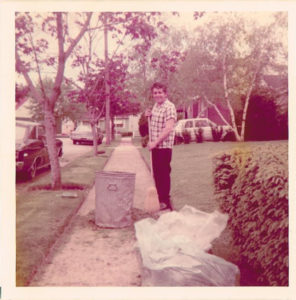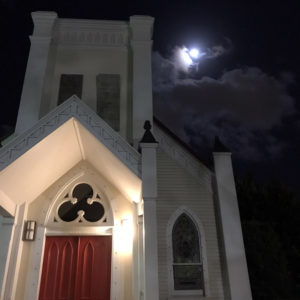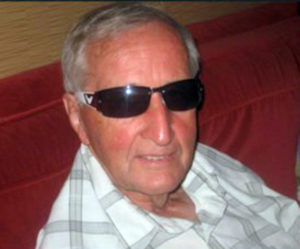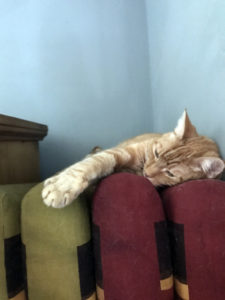
It is a year ago now that our Covid-19 isolation began, and when I sat down today to write about St. Urho’s Day, which comes each 16th of March, I got reacquainted with the Convivio Book of Days chapter I sent out on this day last year. Reading it again reminds me of just how far we’ve come to get here today. It made me feel like we’ve learnt so much, like we’ve done so much… so I decided to share that same story with you here today, too, in hopes it makes you feel a bit of triumph as well.
You’ll read about the Kibble Game, but in the year that’s passed, Haden the Convivio Shopcat has decided she’s not so crazy for kibble, and so we no longer play that game. She’s 15 now and though she’s in great health, she does have an underlying condition that requires us to give her 200 ml. of fluids each day, subcutaneously, and a dose of compounded liquid medicine. The medicine is chicken flavored, but still she hates it. And while we may not play the Kibble Game any more, last night was kind of like a game of professional football: Seth at one end of the kitchen, me at the other, Haden running back and forth between the goal posts until Seth finally dove and tackled her at the end zone. Never a lack of excitement here. (The picture above, by the way, is Haden, content, in one of several favorite napping spots in the house––she is her good old self as long as she has her fluids and meds to keep her gut feeling well. If you know a way we could successfully explain that to her, perhaps she’d come around willingly for her treatments.)
The bookstore downtown that we almost bought? That’s closed now. Lots of my friends who own small local restaurants still are struggling. But there is light in the future, we all feel this. Things are looking better.
Most everything else, though, is the same, right down to my working on everyone’s taxes for the past few weekends. I guess we always have been well, even when things last year were looking bleak. We wish that same wellness for you. Read on, then. Allow yourself to feel a bit of nostalgia for when this weirdness all began, then read further for news on a couple of virtual events this week where we can all see each other again (at least on screen, and for now, I’ll take that). If you could join us, I’d like that a lot. ~ John
•
Convivio Book of Days, March 16, 2020:
St. Urho, St. Patrick, St. Joseph, and Tax Season
I’ve been working on taxes for the better part of several weekends now––my own, and my mom’s, and my sister’s. It has fallen upon me to do this––me, the most disorganized, least mathematical person in the family. But I find there is a certain satisfaction that comes each year with accomplishing this task; it appeals to the part of me that likes to cross things off lists. As in, check. Done. And though I do strive for accuracy, there comes a point each spring where I just decide that it is ok if the federal government receives a little more from me than it is entitled to. A bit of a well being tax, if you will. If it means I can stop thinking about numbers and depreciation and amortization, I feel it is money well spent.
And so it has come to pass that this afternoon, even in the midst of all the files and receipts and checkbooks spread upon the kitchen table, I have just finished playing the Kibble Game with the cat (I toss kibble, she chases it and hunts it down) and I have poured myself a tea bowl full of water, one of Seth’s fine pottery creations, spiked with lemonade, and I’ve put the oven on to reheat some leftover lasagna that my mother made. Seth is outside, working on a garden project. Not a bad Sunday afternoon, after all, despite taxes, and all that’s going on in the world.
It’s a strange time, isn’t it? We are celebrating this week’s saints’ days––days we would normally celebrate as extended family––apart, for the sake of preserving good health. Last night’s early St. Patrick’s Day dinner was canceled, but I did pick up from my mom and sister––while maintaining 6 feet of distance and touching no surfaces in the house––some of the corned beef and cabbage they made, and Marietta’s famous Irish Soda Bread. Not a drop of Irish blood in her, and yet my sister makes the best soda bread I’ve ever had. Each year, it just gets better and better. Seth and I had it with dinner last night and with breakfast this morning, warmed and buttered, and someday, when there is a Real Book version of the Convivio Book of Days, her recipe will be in it. Oh, maybe I’ll just give it to you today, so you can make it this week. We need things to celebrate, no? Even if we can’t these days gather together as much as we’d like, still it is important to appreciate the importance of that gathering. If we can’t do it together, perhaps we can do it virtually. We see these days so many reasons why the Internet and social media are unhealthy for us: the wholesale spread of rumors and bad information, the politicizing of tragedy, the fanning of flames of panic. I try my best to step away from all that, to not participate, and to focus on what is inherently good about contemporary modes of communication: we can, for instance, Skype with our loved ones while we have our own smaller, in-home celebrations. My mother and her sister are on Skype with each other most every night: a beautiful connexion from Florida to Illinois, the two DeLuca girls from East New York Avenue, in their 90s and still chatting with each other before bed. I love this. Sometimes they’re up way into the darkest hours of the night, my cousins and my Aunt Anne and my mom and my sister taking turns watching each other as they doze off on couches thousands of miles apart from each other. They don’t even have to talk. They just keep each other company. How wonderful that we can do this now, just be there for each other, even while apart.
And so what do we have this week to celebrate? To begin with, St. Urho’s Day on the 16th. Urho is the fictional saint of Finland, the Finns’ tongue in cheek answer to the infinitely more famous St. Patrick, whose day follows. St. Urho is said to have driven all the grasshoppers from Finland, saving the vineyards from certain destruction. It’s a holiday and a story you won’t know unless you live amongst Finns, as I do. To be honest, I don’t think you’ll find many vineyards in Finland, but St. Urho’s Day has become a day to celebrate the wine that comes from the fruit of vineyards, so go on, enjoy responsibly.
The next day, of course, brings St. Patrick’s Day. The celebrations this year will be considerably quieter than they typically are. A fine day to appreciate all things Irish. And then on the 19th, it’s St. Joseph’s Day. Father’s Day in Italy, a day when Italian bakers will be serving up zeppole and sfinci, the traditional pastries for San Giuseppe. This year for St. Joseph’s Day, it will be very quiet in Italy. If you do venture out here in the States, stop at an Italian bakery and get some pastry for the day. The bakers will appreciate it, and so will you. Just please, wash your hands after handling the bakery box. Take the advice of the Italian Nonna on YouTube (and yes, even my mother has had to give up the Kleenex she keeps in her sleeve).
So much has changed in our lives in such a short time. Socially, economically. For about a year now, Seth and I have been searching for a just-right public space for Convivio Bookworks, as it was feeling like time to move this small business out of our small house and into the broader world. We had been looking high and low through Lake Worth and West Palm Beach. If you had checked with us even just a month ago, we were giving serious consideration to a location on Lake Avenue, a sort of marriage of an existing bookish business with our own, creating a new spin on both, perhaps. We’ve put all these plans on hold, I suppose indefinitely. Making a business move like this is an expensive step, and we don’t have much to work with. Whenever we do make that leap, rest assured it will be a highly calculated move (there are those numbers, again).
And so we continue to do what we do. When you get right down to it, it’s kind of exciting to live in a tiny house and run a business out of it. Open up a closet and you’ll find bed linens and Dia de Muertos ofrenda figures. In the cupboard in the living room, there’s the china and the cutlery… oh and all the handpainted pysanky eggs from Ukraine. It can get dicey at times when someone orders something and I forget where it is. The only guarantee is that when I stored it away, I put it in a very logical place. It’s the logic that is fleeting and ephemeral, for me, anyway.
Please stay well, act wisely, mind your way in this world. And wash your hands (addendum March 16, 2021: And wear your mask!). Much love to you all. Now go. Bake some soda bread.
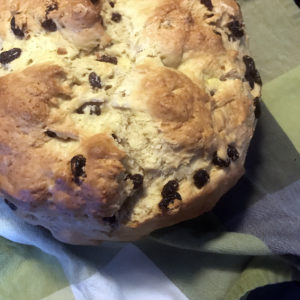
MARIETTA’S IRISH SODA BREAD
5 cups flour (plus up to an additional cup, depending on stickiness of dough)
3 tablespoons sugar
1 tablespoon baking powder
1 teaspoon salt
¾ teaspoon baking soda
6 tablespoons butter or shortening
1 cup raisins
1 tablespoon caraway seeds (optional)
2 eggs, beaten (reserve 1 tablespoon for later)
1 ½ cups milk (or buttermilk, if you have it)
If you’re using a stand mixer, place all ingredients in the mixing bowl (except for reserved tablespoon of egg) and mix. Start with 5 cups of flour, adding up to an additional cup, if necessary, if dough is sticky. Next, using dough hook, knead in bowl for a minute or so.
If, like me, you have to mix things by hand, mix flour, sugar, baking powder, salt, and baking soda in a large bowl. With a pastry blender, cut in butter or shortening until mixture resembles coarse crumbs. Stir in raisins and caraway seeds. Add beaten eggs (be sure to reserve 1 tablespoon of beaten egg for later), and then add the milk or buttermilk. Mix well. If the dough is very sticky, add up to 1 additional cup of flour, a little at a time.
Meanwhile, preheat oven to 350 F and butter a 2-quart round casserole; set aside. Flour a board and turn out dough onto it; knead for about a minute. Shape into a ball. Place the dough in the casserole, and in the center of the dough, with a sharp knife, cut a cross about 4” long and ½” deep. Brush dough with reserved egg.
Bake about 1 hour and 20 minutes or until a toothpick inserted into the bread comes out dry. Cool in casserole on wire rack for 10 minutes, then remove from the casserole and cool further on rack.
The image for last year’s version of this chapter featured Haden the Convivio Shopcat, snoozing atop some of the boxes of Convivio Bookworks inventory we keep in the house. I figured I’d update the image this time around, so here’s a new favored place for her catnaps: between the wall and a cupboard in our bedroom is where we stack duffel bags, winter clothes, and four chair cushions, to within three feet of the ceiling. (It’s a small old house with hardly any closet space, so we’ve got to be creative in our storage solutions.) These days, Haden likes to sleep atop the cushions, close to the ceiling. We call this “smooshin’ the cushions.” The image just above: one of four (!) Irish Soda Breads my sister Marietta has baked this week.
Please join us, virtually!

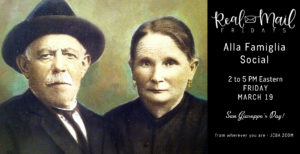
Addendum March 16, 2021: You are cordially invited to gather with us virtually for two events this week: On Wednesday, March 17 at 3 PM Eastern, I’ll be broadcasting Book Arts 101: Urho, Patrick, Giuseppe live from the studios of Convivio Bookworks. I’ll be chatting and showing artists’ books from the Jaffe Center for Book Arts that are related to Finland, Ireland, and Italy. You have to register to watch the live broadcast on Zoom… click here to do so. It should also be simulcast live on our Convivio Bookworks Facebook page (fingers crossed).
And then on Friday, March 19, join us for the Jaffe Center’s weekly virtual Real Mail Fridays letter writing social. This week’s social is a special one for St. Joseph’s Day with a theme influenced by the 1987 Norman Jewison film Moonstruck… for these are my people. I relate to them. I’ll be playing a setlist of Italian music while we gather to do whatever it is we need to do: it’s a letter writing social, but the folks who join in are not necessarily writing letters. Some are binding books, some are doing homework, some are baking. People come because it is a chance to get together and feel part of something. It’s an amazingly calming and heartwarming way to wrap up your week. Click here to join us (it’s the same Zoom link each and every Friday).
Springtime Stock-Up Sale continues at the Convivio Bookworks online catalog! $10 off $65 on anything in the shop when you use discount code BUNNY, plus free domestic shipping. We appreciate your support!
